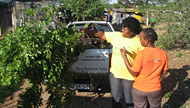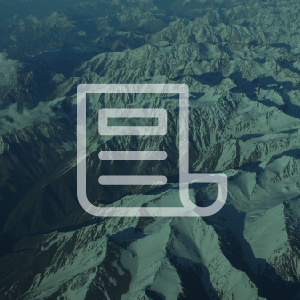Support for South Africa's national climate policy
South Africa is the powerhouse of the African continent, because it is the largest national economy in Africa. Yet at the same time South Africa is also responsible for almost half Africa's electricity consumption and is a significant producer of greenhouse gas emissions.
South Africa is the powerhouse of the African continent, because it is the largest national economy in Africa. Yet at the same time South Africa is also responsible for almost half Africa's electricity consumption and is a significant producer of greenhouse gas emissions. This situation has developed because most of the energy comes from the abundantly available coal deposits. As a result the country is able to produce cheap electricity, which in turn means an important competitive advantage for energy intensive industries such as the mining sector.
However, South Africa is also severely affected by climate change. Extreme weather events threaten important economic sectors such as agriculture and tourism. The South African government is now confronting these challenges and is determined to take steps to combat climate change. That is why South Africa is committing itself to reducing its emissions by 34 per cent by 2020 and by 42 per cent by 2025.
Strengthening institutions and competences
Since 2009 the Climate Support Programme (CSP), promoted by the International Climate Initiative (ICI) and implemented by Deutsche Gesellschaft für Internationale Zusammenarbeit (GIZ), has been advising the South African Department of Environmental Affairs (DEA) on the implementation of climate protection strategies, adaptation scenarios and the development of economic instruments to reduce greenhouse gases. The declared aim is to strengthen capacity in the fields of analysis, policy development and consensus building. South Africa is keen to implement an effective climate policy and has already demonstrated this by hosting the international climate summit in November/December 2011.
Furthermore, CSP is coordinating and supporting the publication of pioneering research into climate-relevant subjects such as climate finance and cost analysis of mitigation actions. The research findings are an important basis for the further development of the White Paper. The creation of a national MRV (measurement, reporting and verification) system is another priority; for this GIZ is working with DEA on developing methods and institutional competences in order to establish national standards for a MRV system.
Results and replication
In October 2011 South Africa published the National Climate Change Response White Paper, a comprehensive climate protection policy. The project made an important contribution to the development of this White Paper. It helped the Department of Environmental Affairs to conduct public hearings in seven South African provinces, where the draft policy paper was discussed in detail with representatives of civil society, industry and local government. By approving the White Paper South Africa commits itself to making a fair contribution to the stabilisation of global greenhouse gas emissions. The document will now be the reference for further, specific legislative initiatives.
Early successes are evident in the establishment of the MRV system. An initial successful stakeholder dialogue took place in January 2012, at which DEA, conservation organisations and industry were able to engage in a thorough exchange of views. In addition to this the project partners are working on a 'climate change toolkit' to provide the various local authorities with instruments that allow them to include climate-relevant aspects in local development planning.
By approving the White Paper and establishing an effective MRV system, South Africa has laid the foundation for a progressive national climate policy which can provide an example for other developing countries and emerging economies. The ICI project, running until 2013, will continue to support this effort.
The link has been copied to the clipboard
Contact
IKI Office
Zukunft – Umwelt – Gesellschaft (ZUG) gGmbH
Stresemannstraße 69-71
10963 Berlin




